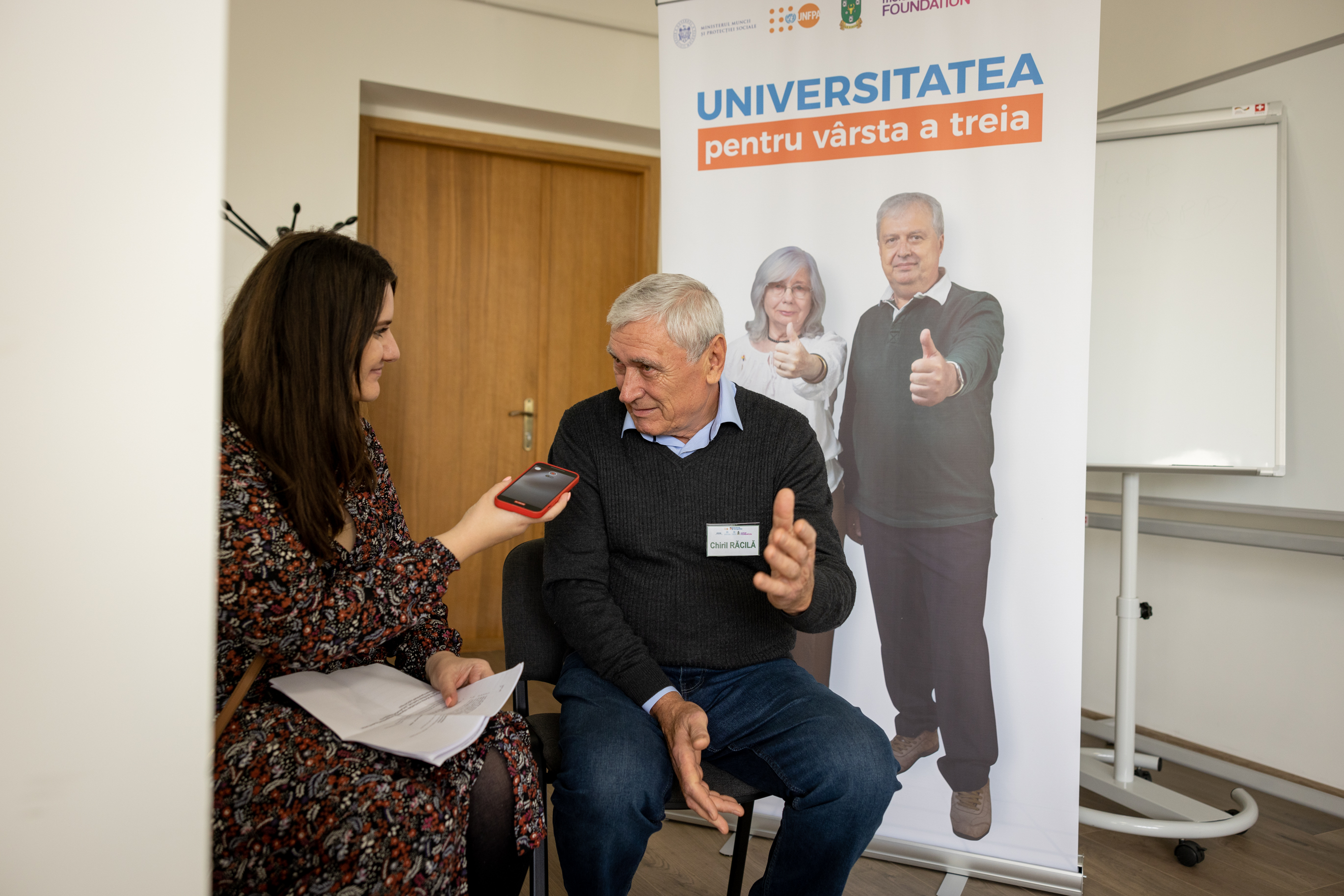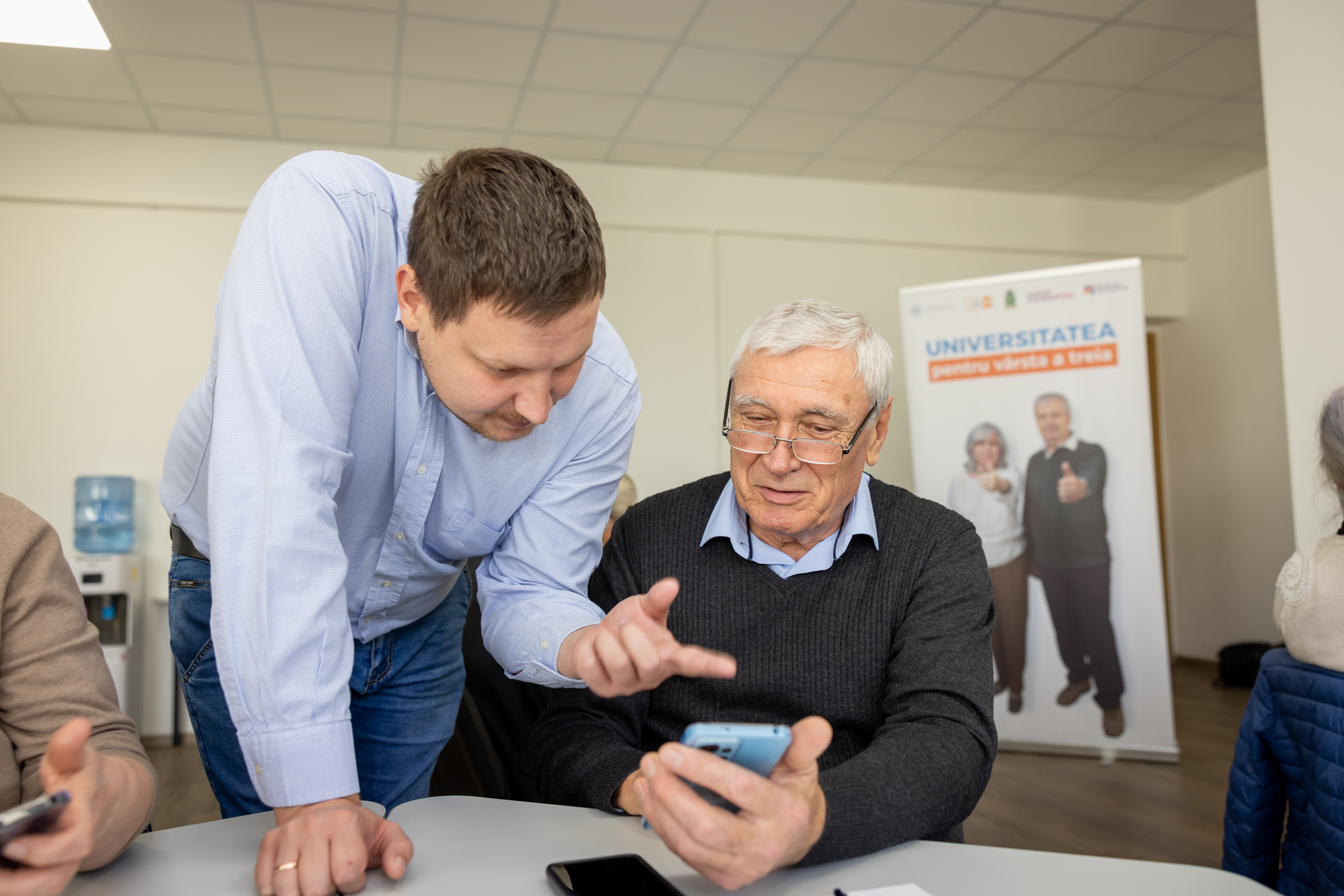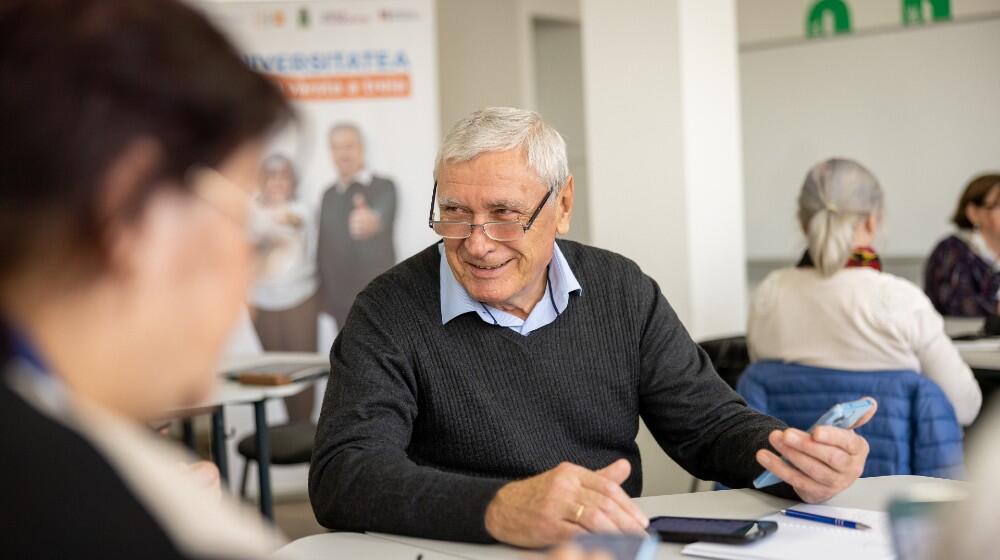Chiril Răcilă is listening attentively to what the professor is telling him while holding his phone, switching his attention between the interactive whiteboard and his smartphone. In today's lesson, alongside his fellow senior students, he is learning how to download and correctly use WhatsApp. Mr. Chiril is among the first to successfully complete all of the steps, so it was no surprise when the professor whispered to us that he's "one of the best students".
Chiril Răcilă was born in 1950. He is an engineer by profession, and after 51 years since his graduation, he has become a student again, joining 39 other men and women of his age from the Republic of Moldova and Ukraine at the University of the Third Age.
U3A is a pilot initiative launched by the United Nations Population Fund (UNFPA) in partnership with the Ministry of Labor and Social Protection, the Ministry of Education and Research, the State University of Moldova, and the Moldcell Foundation. The organizers have chosen to implement a Czech model, adapted to the local cultural and academic context.
Lifelong learning, social inclusion, intergenerational dialogue, harnessing the human potential across all ages and encouraging older people to age actively and healthily are just a few of the project's objectives. There are no exams, grades, or formal education goals to aim for. Seniors attend simply for the joy of learning and professors are thrilled to teach them.

Keeping up with modern technologies and getting closer to the younger generation
For the first semester, students are encouraged to attend the "Digital Skills Development" courses using the smartphones donated by the Moldcell Foundation. These devices are connected to Wi-Fi to enhance the learning process and to gain access to essential educational and digital resources.
"When I was young, I grasped information more easily and quickly. Now, the professor needs to repeat and show us the steps 2 to 3 times," Mr. Chiril remarked with a smile.
The senior student has two children, three grandchildren, and a great-grandchild. One of his sons, along with his wife and their two children, lives abroad. The family enthusiastically embraced the idea of him going back to school.
"Both my wife and children were pleasantly impressed. The kids called me and congratulated me, amused by the fact that their grandpa is a student again. This way, I'll be closer to the younger generation," says the senior student.
Mr. Chiril states that the information he's learning in class is already proving itself to be useful, particularly when communicating with his grandchildren living abroad. "Certainly, the digital skills acquired in class will help me communicate more easily with my grandchildren. Even though we're not traditional students, we still have homework. So, besides class hours, I have to find time to study additionally."
The thirst for lifelong learning in the Republic of Moldova
According to the "Generations and Gender" (GGS) Survey, only 2% of people aged 55-74 are involved in lifelong learning activities, which is below the EU average of 4.5%. The need for these types of activities in Moldova is also confirmed by the high number of applications submitted for admission to U3A. Considering the approximately 200 requests received, the decision was made to pilot two groups instead of the one planned initially.
"As soon as I saw the announcement on TV, I collected the required documents for the application, filled out the form, and the next morning, I submitted it in person. When I was informed that I had been selected, I thought myself to be lucky. It's something that happens once in a lifetime," enunciates the senior emotionally.
Mr. Chiril says he has already made some friendships with fellow students. In fact, he says, the most important thing is that he leaves the house and socializes during class hours.
Young senior students eager for knowledge
Dragoș Ungurean is a young economics professor who has been teaching at the State University for seven years. More recently, starting in September 2023, he has been teaching the "Digital Skills Development" course for the two senior student groups.
"I don't see significant differences between young students and the older ones. However, young people were born with a phone in their hands, and for the older people, I try to teach the material more slowly. Information is absorbed in varying ways even when the amount is the same," he says.

Data from the GGS survey also shows that only 1 in 3 people aged 60 access the Internet. In this course, students learn from the beginning how to use an Internet connected smartphone - how to identify useful and relevant apps, how to install and use them, how they work, where to press, and where not to - in other words, the risks of the online environment.
"I want to! This is the motto of this group of senior students. They are punctual, responsible, and eager for knowledge. If they don't succeed at first, they keep trying until they achieve the desired result. I try to work personally with each student according to their individual needs", adds the professor.
Senior student Chiril Răcilă concludes: "At an advanced age, studying digitalisation, engagement, communication and everything related to learning is an exercise that helps me extend my activity and well-being, and why not, avoid mental illnesses and exercise my memory."
U3A is a pilot program running from October 2023 to April 2024 with technical and financial support from the United Nations Population Fund (UNFPA), the Ministry of Labor and Social Protection, the Ministry of Education and Research, the State University of Moldova and Moldcell Foundation.
The development of the "University of the Third Age" concept is part of the objectives of the National Program for Active and Healthy Aging 2023-2027, implemented by the Ministry of Labor and Social Protection in partnership with UNFPA.


